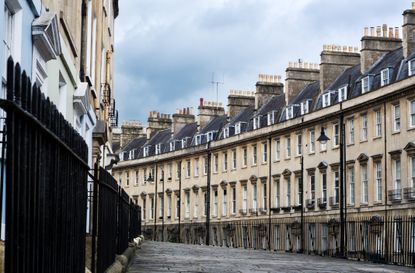Nationwide: House prices fall at fastest rate since July 2009
High borrowing costs continue to undermine the housing market, but some buyers are making their move before rates rise further.


House prices in the UK slumped to -3.8% in July - the greatest fall since July 2009 - as high borrowing costs continue to deter prospective buyers.
The price of a typical home is now 4.5% below the August 2022 peak.
In July alone, house prices fell by 0.2% on a seasonally adjusted basis, with the average home now worth £260,828, down from £262,239.
Subscribe to MoneyWeek
Subscribe to MoneyWeek today and get your first six magazine issues absolutely FREE

Sign up to Money Morning
Don't miss the latest investment and personal finances news, market analysis, plus money-saving tips with our free twice-daily newsletter
Don't miss the latest investment and personal finances news, market analysis, plus money-saving tips with our free twice-daily newsletter
Nationwide said an average first-time buyer with a 20% deposit would have to fork out 43% of their take-home pay to meet mortgage repayments at their current rates. Only a year ago, a mortgage would have taken up 32% of a buyer’s pay packet.
The lender’s analysis also shows a 10% deposit is now equivalent to 55% of gross annual average income.
“This challenging affordability picture helps to explain why housing market activity has been subdued in recent months,” said Robert Gardner, chief economist at Nationwide.
“There were 86,000 completed housing transactions in June, 15% below the levels prevailing the same time last year and around 10% below pre-pandemic levels,” he said.
Meanwhile, separate data from the Bank of England (BoE) revealed an uptick in the number of mortgage approvals - now at the highest level since October last year. Suggesting buyers are looking to lock-in mortgage deals earlier ahead of a possible rate rise later this month.
Is now a good time to buy a house?
With a mixed picture emerging from different industry data sources and house price indices, buyers are tentatively waiting in the hope of more favourable economic conditions, said Myron Jobson, senior personal finance analyst at interactive investor.
He added, “Both buyers and sellers will need to thread carefully in the current uncertain period in the housing market. Sellers may have to adjust to the new status quo in the housing market by being flexible on price given the growing challenges posed by high mortgage rates and inflation. Buyers may be forced to adjust their criteria or wait even longer until they can make the numbers work to get on or move up the property ladder.”
Is the housing market at a turning point?
June saw a 6% monthly increase in seasonally adjusted residential transactions and a 5% increase in seasonally adjusted non-residential transactions relative to May, according to HMRC data, but as Nationwide’s findings show, high borrowing costs are weighing on house prices.
June’s HMRC residential market data showed the volume of transactions was 15% lower than in June 2022.
A 6% rise in transactions in June compared to May demonstrates the “remarkable resilience in demand for homes in the face of an acute affordability squeeze,” according to Jobson.
But this does not “necessarily suggest that the property market is turning,” he adds. On a yearly basis, HMRC’s data shows a 15% fall in transactions carried out in June.
Higher mortgage rates have made home ownership and remortgaging less affordable for many.
“As a result, many potential buyers have placed their plans to buy a home on the backburner until such a time when they can make the numbers work - or decide not to enter the market at all due to the higher expenses. But there is still a cohort of buyers who are able to move up the property ladder despite the harsh market conditions,” Jobson says.
Currently, the average two-year fixed mortgage has eased to 6.81% according to Moneyfacts, while five-year deals have dropped to 6.34%.
Alice Hayne, personal finance analyst at Bestinvest notes, “There may be slightly better mortgage deals on the market than a few weeks ago, but first-time buyers and those refinancing also have difficult decisions around whether to secure a two-year or five-year mortgage and whether to choose a fixed or variable product.”
“While two-year fixes are more expensive than their five-year equivalent, borrowers may be anxious not to lock in a costly long-term deal if rates are about to improve. Many are now taking a gamble on tracker mortgages, even though interest rates are tipped to go higher, in the hope that rates retreat next year,” she says.
What would a rate rise mean for the housing market?
All eyes will be on the BoE and whether it decides to up rates yet again, but a lower-than-expected peak rate of inflation could “be enough to keep the cost of fixed-rate deals on the downward trend, which could help elevated property transactions – but there are no guarantees,” said Jobson.
Those on a fixed-rate mortgages deals that aren’t coming to an end in the near future will be spared from the upcoming rise, but 2.2 million homeowners on variable mortgage rates will “continue to feel the full brunt of the expected increase in interest rates,” Jobson said.
“They are likely to face higher costs for some time to come.”
Tom is a journalist and writer with an interest in sustainability, economic policy and pensions, looking into how personal finances can be used to make a positive impact.
He graduated from Goldsmiths, University of London, with a BA in journalism before moving to a financial content agency.
His work has appeared in titles Investment Week and Money Marketing, as well as social media copy for Reuters and Bloomberg in addition to corporate content for financial giants including Mercer, State Street Global Advisors and the PLSA. He has also written for the Financial Times Group.
When not working out of the Future’s Cardiff office, Tom can be found exploring the hills and coasts of South Wales but is sometimes east of the border supporting Bristol Rovers.
-
-
 How to check for Premium Bonds
How to check for Premium BondsHave you misplaced a savings product from NS&I? Here’s how to check for Premium Bonds and cash in any unclaimed prizes
By Tom Higgins Published
-
 Number of ISA millionaires tops 4,000
Number of ISA millionaires tops 4,000The number of ISA millionaires has surged to more than 4,000 - what does it take to hit the seven-figure sum?
By Katie Binns Published

